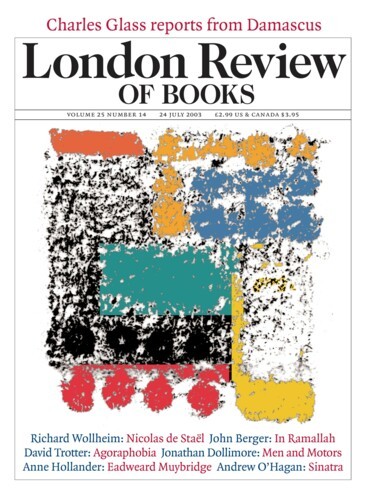The first recorded use of the word ‘freedom’ in English comes in the penultimate chapter of Alfred the Great’s translation of Boethius’ De consolatione philosophiae (c.888), in a discussion of free will: ‘Þu segist þæt God sylle ællcum freodom swa god to donne swa yfel’ – ‘You say that God gives to everyone the freedom to do both good and evil.’ ‘Boethius’ goes on to ask why God allows men to be wicked and make evil choices. Ah, that old chestnut, ‘Philosophy’ thinks. (I make no apology for being so free in my translation: it’s got nothing on the freedoms that Alfred, his purposes as much political as scholarly, took with the original, such as bringing God into it.) Imagine a king, Philosophy says, whose subjects were all slaves, with no free men in the kingdom: that wouldn’t be very good now, would it? Indeed not, Boethius agrees. Well then, continues Philosophy, in that case it certainly wouldn’t do for God’s kingdom to have no free creatures in it, would it? Quite so, Boethius says, before going on to ask: but how do you reconcile free will with divine omniscience? (Tony Blair must be relieved that Boethius doesn’t sit on a House of Commons select committee.) Philosophy has a pretty decent answer. (The Prime Minister must long to have someone like that on his side.)
Anglo-Saxon chiefs have changed over the last millennium or so: it’s easy enough to imagine George W. Bush falling asleep and burning the cakes; harder to see him taking time off from ruining the country to translate a little Neoplatonist philosophy. Not that that stops him bandying the word ‘freedom’ around as if it were a tax break for his buddies. ‘Free’ is derived from an Indo-European root meaning ‘to love’; it’s related to ‘friend’. ‘The primary sense of the adjective,’ the OED explains, ‘is “dear”; the Germanic and Celtic sense comes of its having been applied as the distinctive epithet of those members of the household who were connected by ties of kindred with the head, as opposed to the slaves.’ More recently, ‘free’ has come to be used by the leaders of the ‘free world’ to signify simply the world that they lead. This shift can be seen as a reversal of the process described by the OED, a return to the earlier meaning: the ‘free’ now are those dear to the Bush Administration. ‘Freedom’ has come to denote, quite precisely, ‘the Government of the United States and its supporters and allies’: those who are famously ‘for us’, as opposed to those others who are by default ‘against us’. The notorious introduction of ‘freedom fries’ and ‘freedom toast’ to the congressional canteen established one sense of the word as being the opposite of ‘French’: and, even if you think they’re cheese-eating surrender monkeys, you can’t say the French aren’t, in the pre-9/11 sense, at least as free as Americans.
There are people out there who still understand the word as meaning something other than ‘patriotic’, such as the US Army sergeant in Iraq who told the Economist: ‘It sucks. You promise freedom. They get martial law.’ In the last frame of the most recent installment of ‘In the Shadow of No Towers’ (see LRB, 10 July), Art Spiegelman riffed on the first line of the chorus of ‘Me and Bobby McGee’, ‘Freedom’s just another word for nothing left to lose’: ‘I thought I’d lose my life on 9/11 . . . I lost my mind soon after, and lost my last speck of faith in the USA when this cabal took over – I guess this really is the land o’th’free!’ One might add that freedom in the Kris Kristofferson sense is what has been brought to Iraq, even if many people there had little left to lose long before the invasion. Anyway, the more you hear about ‘freedom’ from the powers that be, the harder it is to hold onto the sergeant’s meaning. The word appears 2210 times on the official White House website, www.whitehouse.gov (‘democracy’, to give a sense of scale, crops up 577 times; ‘oil’, 537; ‘tax cuts’, 311; ‘re-election’, a modest 49), but only 134 times on the more illuminating – and certainly more amusing – parody, www.whitehouse.org.
With fearful symmetry, ‘terror’ has acquired a new meaning, too. When President Bush or one of his followers repeats the mantra that ‘freedom shall prevail over terror,’ he can only mean, if the implied clash of abstractions is to have any meaning at all: ‘We shall prevail over them.’ In the ‘war against terror’, the referent of ‘terror’ is whomever we are fighting: the focus of the war is not determined by who the enemy is, as would be reasonable to expect, and as those waging it claim; rather, the nature of the enemy is determined by the focus of the war. Or, as one of the ‘patriotic posters’ on offer at www.whitehouse.org puts it, ‘Saddam? Osama? True patriots just split the difference and aim for the towel.’
Send Letters To:
The Editor
London Review of Books,
28 Little Russell Street
London, WC1A 2HN
letters@lrb.co.uk
Please include name, address, and a telephone number.

